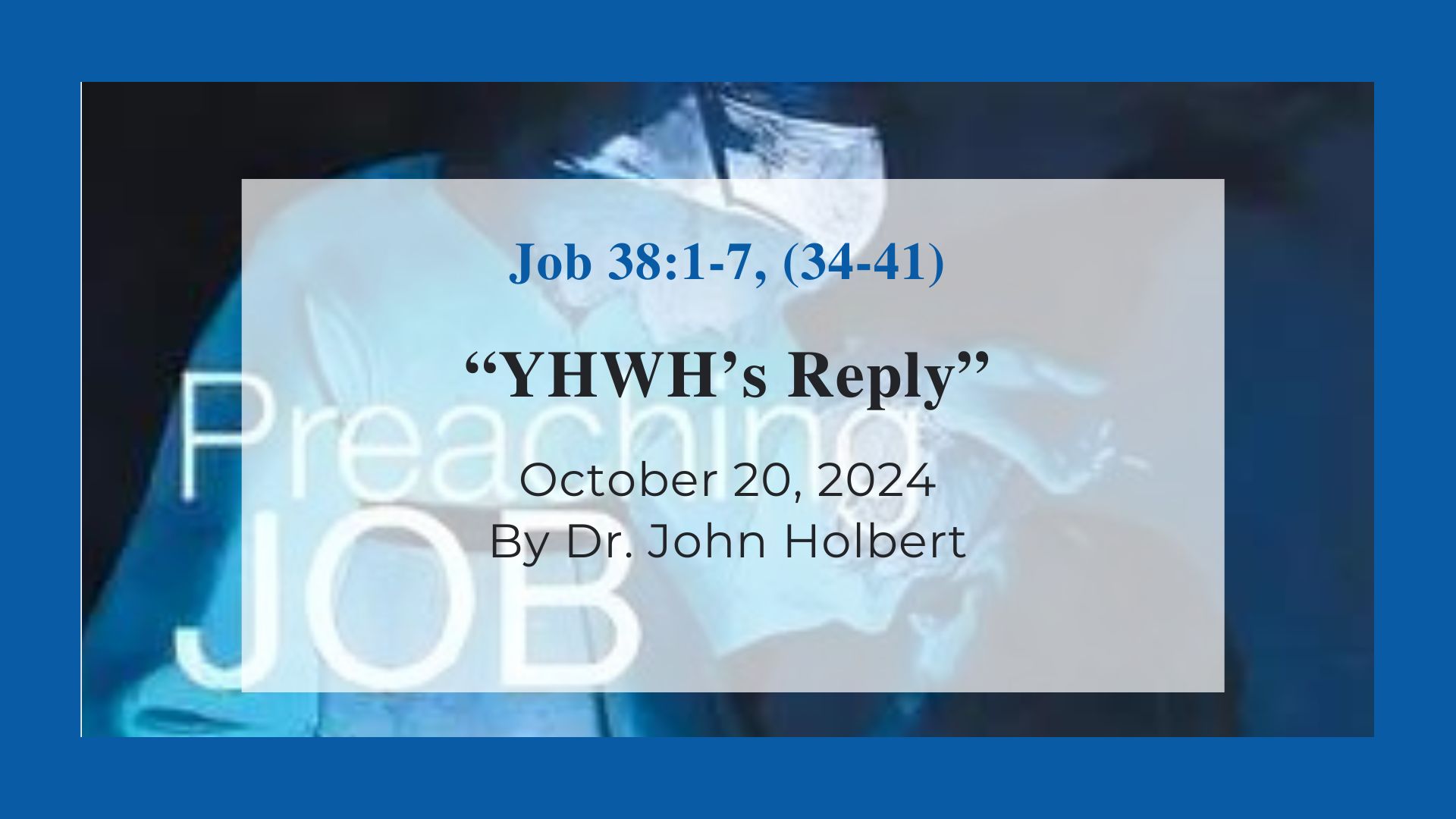YHWH's Reply = Reflections on Job 38:1-7, (34-41), Proper 24 Year B
by John Holbert on Monday, October 14, 2024

Proper 24. October 20, 2024. Job 38:1-7, (34-41). “YHWH’s Reply”
Vast oceans of ink and countless megabytes of text have been expended in myriad attempts to explain the content and import of the magnificent poetic speeches from the mouth of YHWH in Job. No matter how one understands the poems, few would deny that the poet who wrote them is a supreme master of the Hebrew art. Many of the lines have become cliched so often have they been employed to explain the nature of the God who utters them. As we begin a brief look at them, let me first say that this speech is not designed simply to tell Job to shut up! Too many commentators have said as much, claiming that Job hardly knew what he was talking about when it came to things divine, and hence needed a sharp corrective, both in attitude and language. I would, to the contrary, suggest that no poet would spend such lavish linguistic efforts merely to tell the suffering Job to keep his mouth closed. In fact, as 42:7 appears to suggest, what Job said is not the issue at all. It may be closer to the truth to say that YHWH has listened quite carefully to the speeches of Job (and his friends) and has determined that Job deserves some sort of answer to his anguished questions about the universe, and about YHWH’s plans for it.
This explains YHWH’s opening gambit in 38:2. YHWH speaks from the storm, and the first thing out of YHWH’s mouth is:
“Who is this who obscures design
in words without knowledge?”
The more common reading, of course, for the accusation is “darkens counsel” (so NRSV among a host of others). I think the basic intent of YHWH’s opening is to say as clearly as possible that Job’s speeches, along with those of the friends, have had the effect of obscuring the design of YHWH’s universe. Job has spent all of his speeches, in a crescendo of pain, expressing his intolerable anguish and his fury at YHWH. But note carefully what the poet is doing here. YHWH’ speech is a direct response to the death-wish poem that govern’s nearly all of Job’s argument (see, for example, last week’s 23:16-17). Job consistently expresses anger and frustration and then ends his speeches with a desire for death. This pattern begins in his very first long speech in chapter 3. Job is a master at conjuring up metaphors of darkness and gloom. Indeed, in 10:21-22, he uses seven different words for darkness in these two verses! In sharp contrast, YHWH introduces images of light, tracing an interplay between light and darkness. The universe of God is hardly characterized only by darkness; to the contrary it is filled with amazing light.
YHWH is not merely “putting Job in his place” (another way that commentators speak of this speech) but is reframing and challenging Job to think again about the universe he has continually debunked and derided.
“Gird your loins like a hero,
that I may ask you, and you can inform me.
Where were you when I founded the earth?
Tell, if you possess understanding.
Who fixed its measures, do you know,
or who stretched a line upon it?” (38:3-5)
These are not merely unanswerable questions from YHWH, although they surely are that, but they are spoken to Job to help him think about what he has been saying throughout the dialogue, “words without knowledge,” words that obscure YHWH’s design. YHWH plainly does not want Job to shut up! YHWH wants Job to think and to answer once he has thought more carefully about the design of God.
Job 38:7 is justly famous, a genuine line of poetic genius:
“when the morning stars sang together,
and all the children of God shouted for joy!”
The word for “singing” here is from the same root as the one Job used at 3:7, where he hoped to remove forever the “glad song” that rang in the night of his birth. And those joyous morning stars exist over against the stars at the night of Job’s conception that Job wanted never to appear.
Then YHWH asks Job, “Who hedged the sea with double doors,” (38:8), employing the same word that Job had used to complain that God had blocked all paths for him in his life, had literally “hedged his way.” YHWH is cajoling Job, urging him to think again and then speak, not with ignorant words, but with knowledge now infused with a fuller understanding of the real universe of YHWH.
I am suggesting that the poet designs YHWH’s speech to call forth new speech from Job, not that defiant, angry language of the dialogue, but a genuine dialogue with his creator. And next week, we will hear Job’s reply to YHWH’s request. Just how Job will reply makes a fascinating conclusion to a most wonderful, but still enigmatic book.
